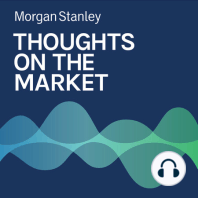3 min listen

Graham Secker: Feeling Positive About UK Equities
Graham Secker: Feeling Positive About UK Equities
ratings:
Length:
4 minutes
Released:
Feb 8, 2022
Format:
Podcast episode
Description
Despite having been one of the worst performing stock markets over the last 5 years, the UK is seeing a dramatic turnaround reflected in the FTSE100 index. Investors may want to take a closer look.----- Transcript -----Welcome to Thoughts on the Market. I'm Graham Secker, Head of Morgan Stanley's European Equity Strategy team. Along with my colleagues, bringing you a variety of perspectives, I'll be talking about our positive view on U.K. equities and why we think the FTSE 100 offers a compelling opportunity here. It's Tuesday, February the 8th at 3 p.m. in London.Having been one of the worst performing stock markets over the last five years, the UK has seen a dramatic turnaround in 2022, with the headline FTSE 100 index, which is the UK equivalent of the S&P 500, outperforming the S&P by around 8% or so, so far, and posting the second-best return of any major global stock market after the Hang Seng in Hong Kong. Looking forward, we think the reversal of fortunes for UK equities can continue for three reasons.First, we think the Footsie 100 index offers a good blend of offense and defense. On the latter, we note the defensive sectors account for 37% of UK market capitalization, which is higher than any other major country or region. Reflecting this, the UK index has outperformed the wider European market two thirds of the time during periods when global equities are falling.When it comes to offense, we know that the UK market is a key relative beneficiary of rising real bond yields, to the extent that a move up in US real yields to our target of minus 10 basis points by year end would imply UK stocks outperforming the rest of the European market by as much as 12% this year. The reason behind the UK's positive correlation to real yields is again down to its sector mix. As well as being quite defensive, the index also has a significant weight in value stocks, such as commodities and financials. These are sectors that tend to perform best when real yields are rising, and investors are becoming more valuation sensitive.While the UK has always had something of a value bias, this relationship is currently even stronger than normal and this leads me to the second driver behind our positive view on the FTSE 100 here, namely that the index is cheap. So cheap, in fact, that you have to go back to the 1970s to find the last time UK equities were this undervalued versus their global peers. To provide some context to this narrative, the FTSE 100 is on a 12-month forward price to earnings ratio of 12.5 versus Europe on 15 times, and the S&P closer to 20 times. As well as a low PE, the UK also offers a healthy dividend yield of 3.6%, which is around twice that on offer from global indices.The third and final support to our positive view on UK equities is that consensus earnings expectations are very low, thereby creating a backdrop for subsequent upgrades that should support price outperformance. For example, consensus forecasts less than 3% earnings growth over each of the next two years, which represents the lowest growth forecast in over 30 years. We think this is too pessimistic and note the consensus expectations for the equivalent Eurozone index are much closer to normal at around 8 percent. The most likely source of upgrade risk around UK earnings comes from our positive view on the oil price, given the energy stocks accounted for 25% of all UK profits last year. With our oil team expecting the Brant oil price to rise to $100 later this year, we see scope for material profit upgrades for individual oil stocks and the broader FTSE 100 index too.One last point a positive view on the UK is primarily focused on the headline Large Cap FTSE 100 index. We are less constructive on UK mid-caps, as this part of the market is more expensive and hence gets less of a benefit from rising real yields. The more domestic nature of the mid-cap index also means it's more exposed to the growing pressure on UK households from rising energy bills, food pri
Released:
Feb 8, 2022
Format:
Podcast episode
Titles in the series (100)
Andrew Sheets: For Markets, Signs, Signs, Everywhere Signs by Thoughts on the Market